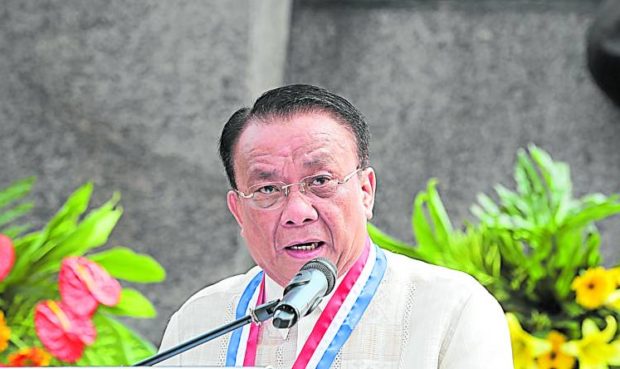No irregularity in ‘Sugar Fiasco 2.0’ import order – Bersamin

Executive Secretary Lucas Bersamin FILE PHOTO
MANILA, Philippines — Executive Secretary Lucas Bersamin has clarified that the order to import sugar earlier this year, which is the subject of a Senate blue ribbon investigation, was “legitimate and fully authorized by the government.”
Bersamin, a former Supreme Court chief justice, was the last resource person to speak in the Monday hearing as he maintained that there was no irregularity in the allegedly illegal entry of sugar shipments in the country ahead of the issuance of Sugar Order No. 6.
READ: Familiar taste? Senate starts probe into 2nd sugar import fiasco under Bongbong Marcos admin
“We confirm that the importation was legitimate and fully authorized by the government. The importation was not an effort at cartelization, nor was it about government smuggling of sugar,” he said.
Bersamin noted that the importation was a “sincere move” to address the rising inflation and sugar prices by establishing a buffer stock of sugar “as a measure to regulate price increases.”
He cited Executive Order No. 18, signed in 1986 by then-President Corazon Aquino, to regulate the sugar market.
“We were, at that time, a net exporter of sugar. The creation of the Sugar Regulatory [Administration] under this executive order had nothing to do with importation,” Bersamin added.
He also said that the first time importation “came to the cognizance” of the SRA was only in August 2002 through a joint memorandum that states, “No imported sugar shall be released to the importer consignee without an SRA clearance.”
After the imported refined sugar flagged by the Bureau of Customs arrived in the Port of Batangas last Feb. 9 sans a permit, Agriculture Senior Undersecretary Domingo Panganiban told the SRA in a memorandum dated Feb. 27 that it may issue clearances for the release of imports to three handpicked international traders.
READ: SRA gets go-ahead to clear release of sugar imports
But Bersamin defended this, saying that the issuance of a sugar order is not a prerequisite for importation.
“Our opinion is that a sugar order is not required to be issued prior to an importation. There are actually several ways of importing sugar – one of them is this sugar order, the other is the minimum access volume. There is also a relevant provision in the Price Act, and the residual is when the President exercises his powers as the chief executive for when there is an urgent need for such experience.”
Bersamin pointed to the Customs Modernization and Tariff Act, which says: “In case of importation, submission of requirements after arrival of the goods but prior to the release from customs custody shall be allowed but only in cases provided for by governing laws or regulations.”
“So to us in the Office of the President, we have committed no irregularity when we issued that sugar order neither was there any violation committed by any of the parties who were involved in the questioned transactions,” he said.
He then called on the Senate to review the rules and adopt amendments “to make clearer this policy” if necessary.
But, Bersamin reiterated, the government did not violate the law.
‘Murky’ policy
Senator Risa Hontiveros, who filed the resolution calling for the Senate blue ribbon probe, pointed out the dangers of this policy issue.
“If we don’t require sugar orders anymore, we allow unfettered importation even on regulated commodities. If we allow the unilateral handpicking of importers, we allow the possible thriving of cartels and monopolies, contrary to the interests of the Filipino people,” she said.
The opposition legislator also called out the “conflicting and sometimes unclear answers” Panganiban had earlier made in the hearing.
READ: Panganiban: Bongbong Marcos had said ‘let’s import through selected sugar importers’
“The policy is murky and lends itself to distrust. And we still need to understand how high this goes,” she said.
In an interview with the media after the hearing, Hontiveros decried Bersamin’s argument.
Hontiveros said the need for a sugar order before proceeding with the importation was not explicitly stated in Aquino’s executive order.
“Pero sa nagdaang mga dekada mula noon, iyan ang naging practice sa ilalim ng SRA kaya iyan din ang expectation in terms of fair play ng lahat ng mga importers at iba pang stakeholders,” she argued.
(But over the past decades since then, that has been the practice under the SRA, so this is our expectation regarding fair play for all importers and other stakeholders.)
If a sugar order is not required for the importation, then, Hontiveros said, what was the point of last year’s Senate blue ribbon investigation into the alleged irregularity in Sugar Order No. 4 – which allowed the importation of 300,000 metric tons of the commodity?
Sugar Order No. 4 green-lighted the importation of 300,000 metric tons of sugar. But it was quickly disowned by President Ferdinand Marcos Jr., who heads the Department of Agriculture and the SRA in his concurrent capacity, prompting the committee to investigate what was dubbed the first-ever sugar fiasco under the Marcos administration.